昔日依依别
英汉互译-译文比较-当年我俩分手时
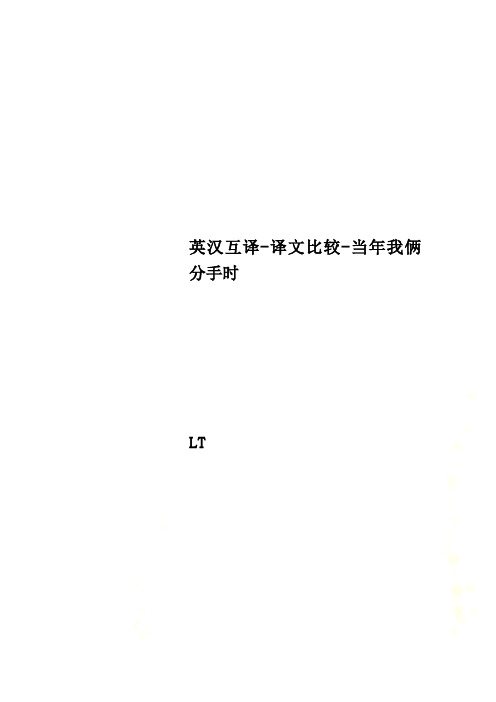
英汉互译-译文比较-当年我俩分手时LTContent1,美诗展示2,原诗鉴赏3,不同译本赏析4,结论5,参考文献1,美诗展示When We Two Parted想当年我们俩分手(卞之琳)When we two parted 想当年我们俩分手,n silence and tears, 也沉默也流泪,Half broken-hearted, 要分开好几个年头To sever for years, 想起来心就碎; Pale grew thy cheek and cold, 苍白,冰冷,你的脸; Colder thy kiss; 更冷是嘴唇; Truly that hour foretold 当年真是像预言Sorrow to this! 今天的悲痛。
The dew of the morning 早晨的寒露在飘荡,Sunk chill on my brow; 冷彻了眉头-It felt like the warning 仿佛是预先警告我Of what i feel now. 今天的感受。
Thy vows are all broken,你抛了所有的信誓,And light is thy fame: 声名也断送;I hear thy name spoken 听人家讲你的名字,And share in its shame. 我也会脸红。
They name thee before me, 人家当我面讲你A knell to mine ear;我听来像丧钟-A shudder comes o’er me- 为什么我从前想像你Why wert thou so dear?值得我这么疼?They know not i knew thee 谁知道我本来认识你,Who knew thee too well:认识得太相熟:-Long,long shall i rue thee 我今后会长久惋惜你,Too deeply to tell. 沉痛到说不出!In secret we met: 你我在秘密中见面In silence i grieve 我如今就默哀hat thy heart could forget, 你怎好忍心来欺骗。
英美经典英文诗歌欣赏
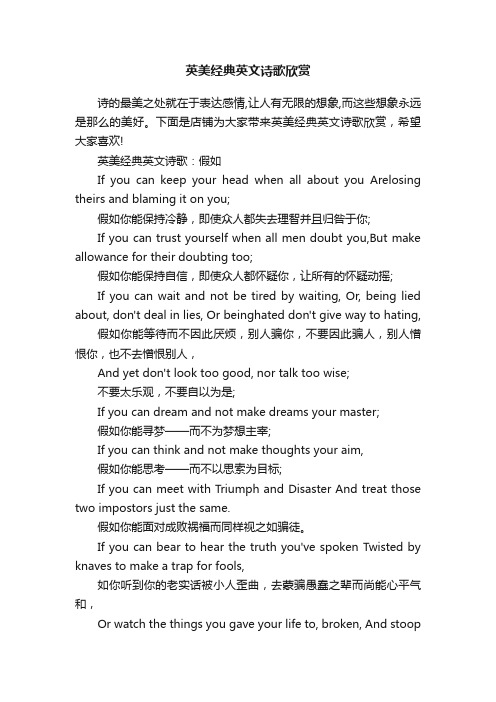
英美经典英文诗歌欣赏诗的最美之处就在于表达感情,让人有无限的想象,而这些想象永远是那么的美好。
下面是店铺为大家带来英美经典英文诗歌欣赏,希望大家喜欢!英美经典英文诗歌:假如If you can keep your head when all about you Arelosing theirs and blaming it on you;假如你能保持冷静,即使众人都失去理智并且归咎于你;If you can trust yourself when all men doubt you,But make allowance for their doubting too;假如你能保持自信,即使众人都怀疑你,让所有的怀疑动摇;If you can wait and not be tired by waiting, Or, being lied about, don't deal in lies, Or beinghated don't give way to hating, 假如你能等待而不因此厌烦,别人骗你,不要因此骗人,别人憎恨你,也不去憎恨别人,And yet don't look too good, nor talk too wise;不要太乐观,不要自以为是;If you can dream and not make dreams your master;假如你能寻梦——而不为梦想主宰;If you can think and not make thoughts your aim,假如你能思考——而不以思索为目标;If you can meet with Triumph and Disaster And treat those two impostors just the same.假如你能面对成败祸福而同样视之如骗徒。
If you can bear to hear the truth you've spoken Twisted by knaves to make a trap for fools,如你听到你的老实话被小人歪曲,去蒙骗愚蠢之辈而尚能心平气和,Or watch the things you gave your life to, broken, And stoopand build'em up with worn-outtools;或者见到你毕生的亊业被毀,而尚能执起破旧的工具去着手重建;If you can make one heap of all your winnings And risk it on one turn of pitch-and-toss,如果在你赢得无数桂冠之后,然后孤注一掷再搏一次,And lose, and start again at your beginnings,And never breathe a word about your loss;失败过后,东山再起,不要抱怨你的失败;If you can force your heart and nerve and sinew To serve your turn long after they are gone,假如你能驱使你的心力和精神,在别人走后,长久地坚守阵地,And so hold on when there is nothing in you Except the Will which says to them: "Hold on!"让你抓牢,尽管你里面己掏空了,只有意志告诉它们“坚持!”If you can talk with crowds and keep your virtue, Or walk with Kings-nor lose the commontouch,假如你能与市井之徒交谈而不失于礼,出入于贵胄之家而不忘苍生黎民,If neither foes nor loving friends can hurt you, If all men count with you, but none too much,假如你能尊重人人而不膜拜何人,既不受制于仇敌亦不受制于亲朋;If you can fill the unforgiving minute With sixty seconds' worth of distance run,假如你能以六十秒长跑去填满不可饶恕的一分钟Yours is the Earth and everything that's in it, And - which is more - you'll be a Man, my son!这个世界的一切都是你的,更重要的是——孩子——你是个顶天立地的人!英美经典英文诗歌:昔日依依别When we two parted In silence and tears,昔日依依惜别,默默无言地流着泪,Half broken-hearted, To sever for years,要分开好几个年头,我们忍不住心碎,Pale grew thy cheek and cold, Colder thy kiss;你的脸冰凉、发白,你的吻更似冷冰;Truly that hour foretold Sorrow to this.呵,那一刻正预兆了我今日的悲痛。
英国文学史名词解释
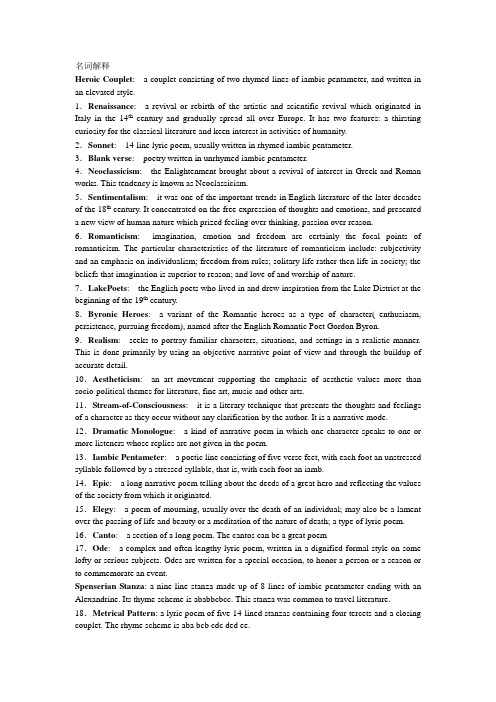
名词解释Heroic Couplet: a couplet consisting of two rhymed lines of iambic pentameter, and written in an elevated style.1.Renaissance: a revival or rebirth of the artistic and scientific revival which originated in Italy in the 14th century and gradually spread all over Europe. It has two features: a thirsting curiosity for the classical literature and keen interest in activities of humanity.2.Sonnet: 14-line lyric poem, usually written in rhymed iambic pentameter.3.Blank verse: poetry written in unrhymed iambic pentameter.4.Neoclassicism: the Enlightenment brought about a revival of interest in Greek and Roman works. This tendency is known as Neoclassicism.5.Sentimentalism: it was one of the important trends in English literature of the later decades of the 18th century. It concentrated on the free expression of thoughts and emotions, and presented a new view of human nature which prized feeling over thinking, passion over reason. 6.Romanticism: imagination, emotion and freedom are certainly the focal points of romanticism. The particular characteristics of the literature of romanticism include: subjectivity and an emphasis on individualism; freedom from rules; solitary life rather then life in society; the beliefs that imagination is superior to reason; and love of and worship of nature. 7.LakePoets: the English poets who lived in and drew inspiration from the Lake District at the beginning of the 19th century.8.Byronic Heroes: a variant of the Romantic heroes as a type of character( enthusiasm, persistence, pursuing freedom), named after the English Romantic Poet Gordon Byron. 9.Realism: seeks to portray familiar characters, situations, and settings in a realistic manner. This is done primarily by using an objective narrative point of view and through the buildup of accurate detail.10.Aestheticism: an art movement supporting the emphasis of aesthetic values more than socio-political themes for literature, fine art, music and other arts.11.Stream-of-Consciousness: it is a literary technique that presents the thoughts and feelings of a character as they occur without any clarification by the author. It is a narrative mode. 12.Dramatic Monologue: a kind of narrative poem in which one character speaks to one or more listeners whose replies are not given in the poem.13.Iambic Pentameter: a poetic line consisting of five verse feet, with each foot an unstressed syllable followed by a stressed syllable, that is, with each foot an iamb.14.Epic: a long narrative poem telling about the deeds of a great hero and reflecting the values of the society from which it originated.15.Elegy: a poem of mourning, usually over the death of an individual; may also be a lament over the passing of life and beauty or a meditation of the nature of death; a type of lyric poem. 16.Canto: a section of a long poem. The cantos can be a great poem17.Ode: a complex and often lengthy lyric poem, written in a dignified formal style on some lofty or serious subjects. Odes are written for a special occasion, to honor a person or a season or to commemorate an event.Spenserian Stanza: a nine-line stanza made up of 8 lines of iambic pentameter ending with an Alexandrine. Its thyme scheme is ababbcbcc. This stanza was common to travel literature. 18.Metrical Pattern: a lyric poem of five 14-lined stanzas containing four tercets and a closing couplet. The rhyme scheme is aba bcb cdc ded ee.文学史中古时期1.Beowulf?贝奥武甫?: the natural epic of the English people; Denmark story, alliteration, metaphor, understatements2.Sir Gawain and Green Knight?高文爵士和绿衣骑士?3.Geoffrey Chaucer(杰弗里乔叟〕:the Father of English Poetry; The Canterbury Tales?埃特伯雷故事集?〔24stories)文艺复兴时期1.Thomas More: Utopia?乌托邦?- the communication between more and the traveler which just came back from Utopia.2.Francis Bacon: the first English Essayist; Essays?随笔集?- Of Studies, Of Truth (philosophical and literary works)3.Thus Wyatt: first to introduce the sonnet into English literature.4.Edmund Spenser: Poet's poet; The Fairy Queen?仙后?(to Queen Elizabeth I)5.William Shakespeare:Sonnet 18(Shall I compare thee to a summer's day)17世纪英国文学1.John Donne: the leading poet of Metaphysical school of poetry; A Valediction: Forbidding Mourning?别离:莫忧伤?2.John Milton: Paradise Lost?失乐园?〔a revolt against God's authority), Paradise Regained?复乐园?〔how Christ overcame Santa) ——stories were taken from Bible3.John Bunyan: the son of Renaissance; Pilgrim's Progress?天路历程?(imagination, shadowing, realistic religious allegory)18世纪英国文学Novel:1.the age of reason, classicism, sentimentalism and romanticism (novels, prose, dramas, poetry)2.Daniel Defoe: representative of English realistic novel; Robinson Crusoe?鲁滨逊漂流记?(the development of a young man from a naive and artless youth to a clever and hardened man)3.Jonathan Swift: Gulliver's Travels?格列佛游记?(fictional, satirical- human nature, the European Government, the differences between religions, whole English state system)4.Henry Fielding: the Father of English novel; The History of Tome Jones, a Foundling ?汤姆琼斯?,satiricPoetry:5.Thomas Gray: Elegy Written in a Country Churchyard?墓园挽歌?6.Alexander Pope: perfected in heroic couplet; An Essay on Criticism?论批评?7.William Blake: pre-romantic; Songs of Innonce?天真之歌?,Songs of Experience?经历之歌?-London, The Tiger8.Robert Burns: A Red Red Rose?一朵红红的玫瑰?Drama:9.Richard Brinsley Sheridan:Master of Comedy of manners;The School for Scandal?造谣学校?浪漫主义时期1798-18321.William Wordsworth: the Lake Poets; The Prelude?序曲?;I Wondered Lonely as a Cloud?我似流云天自游?;The Solitary Reaper?孤寂的割麦女?;features: poet of nature and human heart2.Samuel Taylor Coleridge: the first critic of the Romantic school; The Rime of the Ancient Mariner?古舟子咏?3.George Gordon Byron: vigorous, strong and beautiful; Childe Harold's Pilgrimage?恰尔德哈罗尔德游记?(spenserian stanza, fights for liberty); Don Juan?唐璜?(a broad critical picture of European life); When We Two Parted?昔日依依别?;She Walks in Beauty?她走在美的光影中?;The Isles of Greece?哀希腊?4.Percy Bysshe Shelley: Ode to the West Wind?西风颂?-赞颂西风,希望与其严密相连; Prometheus Unbound?解放了的普罗米修斯?(the victory for man's struggle against tyranny and oppression)5.John Keats: sensuous, colorful and rich in imagery; Ode to a Nightingale?夜莺颂?;Ode on a Grecian Urn?希腊古瓮颂?6.Walter Scott: Father of Historical Novel; combine historical fact and romantic imagination7.Jane Austen: wit, dry humour, subtle irony,realistic; Pride and Prejudice?傲慢与偏见?(Elizabeth and Darcy);Sense and Sensibility?理智与情感?;Emma?爱玛?8.Charles Lamb: Poor Relations?穷亲戚?; Dream-children?童年梦幻?; A Reverie?梦想曲?维多利亚时期1.summit:realistic novel2.Charles Dickens: critical realist writer; humour, wit, happy endings; A Tale of Two Cities?双城记?(London & Paris, where there is oppression, there is revolution); David Copperfield?大卫科波菲尔?;Oliver Twist?雾都孤儿?;Hard Time?困难时世?;Great Expectations?远大前程?;Dombey and Son?董贝父子?;Pickwick Papers?匹克威克外传?3.William Makepeace Thackeray: Vanity Fair?名利场?(to satirize the social more, decadence and corruption of his time; to criticize the values measured by wealth)4.George Eliot: novelist, her novels are celebrated for their realism and psychological insights; Adam Bede?亚当比德?(social inequality);The Mill on the Floss?弗洛斯河上的磨坊?;Silas Marner?织工马南?5.Alfred Tennyson: succeeded Wordsworth as Poet Laureate in 1850; Break, Break, Break?拍吧,拍吧,拍吧?;Crossing the Bar?过沙洲?6.Robert Browning: dramatic monologues; My Last Duchess?我已故的公爵夫人?7.The Bronte Sisters:Charlotte: Jane Eyre?简爱?:简·爱是一个心地纯洁、善于思考的女性,她生活在社会底层,受尽磨难。
英国文学选读作家作品
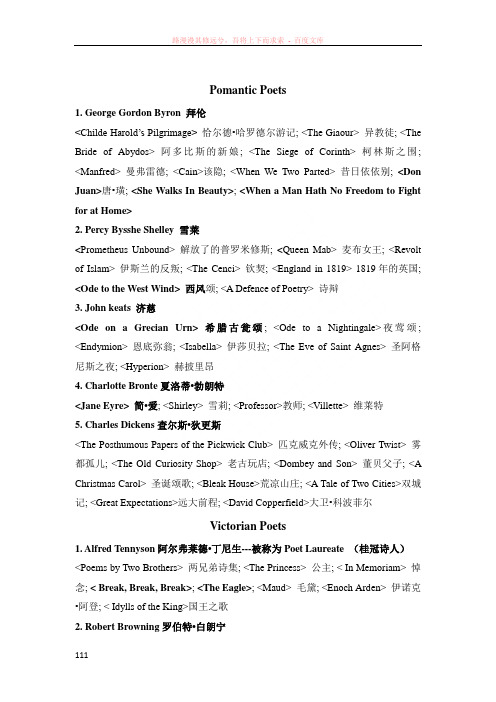
Pomantic Poets1. George Gordon Byron 拜伦<Childe Harold’s Pilgrimage> 恰尔德•哈罗德尔游记; <The Giaour> 异教徒; <The Bride of Abydos> 阿多比斯的新娘; <The Siege of Corinth> 柯林斯之围; <Manfred> 曼弗雷德; <Cain>该隐; <When We Two Parted> 昔日依依别; <Don Juan>唐•璜; <She Walks In Beauty>; <When a Man Hath No Freedom to Fight for at Home>2. Percy Bysshe Shelley 雪莱<Prometheus Unbound> 解放了的普罗米修斯; <Queen Mab> 麦布女王; <Revolt of Islam> 伊斯兰的反叛; <The Cenci> 钦契; <England in 1819> 1819年的英国; <Ode to the West Wind> 西风颂; <A Defence of Poetry> 诗辩3. John keats 济慈<Ode on a Grecian Urn> 希腊古瓮颂; <Ode to a Nightingale>夜莺颂; <Endymion> 恩底弥翁; <Isabella> 伊莎贝拉; <The Eve of Saint Agnes> 圣阿格尼斯之夜; <Hyperion> 赫披里昂4. Charlotte Bronte夏洛蒂•勃朗特<Jane Eyre> 简•爱; <Shirley> 雪莉; <Professor>教师; <Villette> 维莱特5. Charles Dickens查尔斯•狄更斯<The Posthumous Papers of the Pickwick Club> 匹克威克外传; <Oliver Twist> 雾都孤儿; <The Old Curiosity Shop> 老古玩店; <Dombey and Son> 董贝父子; <A Christmas Carol> 圣诞颂歌; <Bleak House>荒凉山庄; <A Tale of Two Cities>双城记; <Great Expectations>远大前程; <David Copperfield>大卫•科波菲尔Victorian Poets1. Alfred Tennyson阿尔弗莱德•丁尼生---被称为Poet Laureate (桂冠诗人)<Poems by Two Brothers> 两兄弟诗集; <The Princess> 公主; < In Memoriam> 悼念; < Break, Break, Break>; <The Eagle>; <Maud> 毛黛; <Enoch Arden> 伊诺克•阿登; < Idylls of the King>国王之歌2. Robert Browning罗伯特•白朗宁< My Last Dutchess> 我已故的公爵夫人; <Paracelsus> 巴拉塞尔士; <Strafford> 斯特拉福; <Pippa Passes> 皮帕走过了; <Dramatic Lyrics> 戏剧抒情诗; < Dramatic Romance and Lyrics> 戏剧传奇及抒情诗; <Men and Women> 男男女女; <Dramatic Personae> 剧中人物; <The Ring and the Book> 指环与书3. Matthew Arnold 马修•阿诺德<The Strayed Reveller> 迷途浪子; <Poems> 诗集; <Poems: Second Series> 诗歌二集; <New Poems> 新诗集; <Essays in Criticism> 评诗集; <Culture and Anarchy> 文化与无政府; <Literature and Dogma> 文学与教条; <Dover Beach> 多福海滩4. Thomas Hardy托马斯•哈代---(小说多以农村生活为背景;自然主义小说家。
最经典优美的英文诗短篇欣赏
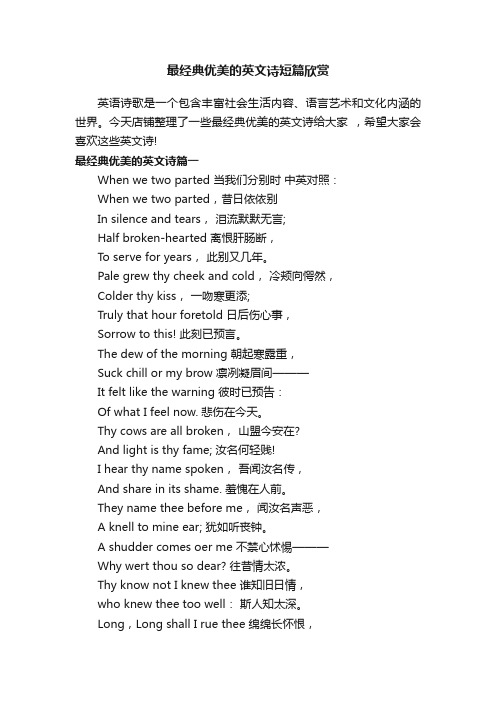
最经典优美的英文诗短篇欣赏英语诗歌是一个包含丰富社会生活内容、语言艺术和文化内涵的世界。
今天店铺整理了一些最经典优美的英文诗给大家,希望大家会喜欢这些英文诗!最经典优美的英文诗篇一When we two parted 当我们分别时中英对照:When we two parted,昔日依依别In silence and tears,泪流默默无言;Half broken-hearted 离恨肝肠断,To serve for years,此别又几年。
Pale grew thy cheek and cold,冷颊向愕然,Colder thy kiss,一吻寒更添;Truly that hour foretold 日后伤心事,Sorrow to this! 此刻已预言。
The dew of the morning 朝起寒露重,Suck chill or my brow 凛冽凝眉间———It felt like the warning 彼时已预告:Of what I feel now. 悲伤在今天。
Thy cows are all broken,山盟今安在?And light is thy fame; 汝名何轻贱!I hear thy name spoken,吾闻汝名传,And share in its shame. 羞愧在人前。
They name thee before me,闻汝名声恶,A knell to mine ear; 犹如听丧钟。
A shudder comes oer me 不禁心怵惕———Why wert thou so dear? 往昔情太浓。
Thy know not I knew thee 谁知旧日情,who knew thee too well:斯人知太深。
Long,Long shall I rue thee 绵绵长怀恨,Too deeply to tell. 尽在不言中。
In secret we met—昔日喜幽会,In silence I grieve 今朝恨无声。
语域理论与语篇翻译

语域理论与语篇翻译一、语域与语篇翻译语域理论包括语场、语旨和语式三个方面的内容。
语场指实际发生的事情,包括语言发生环境、谈话话题以及参与讲话者的整个活动;语式指语言交际的渠道或媒介;语旨指参与讲话者之间的角色关系。
20世纪90年代,哈的姆和梅森等人将语域概念引入翻译研究中。
他们认为,语篇含义并不仅仅由语言体系自身决定,而是由整个语篇的情景语境和交际功能来决定,翻译过程中所追求的,不能只是脱离语境形式上的对等,或是单纯语义等值,而是和语境或语域密切相关的交际功能的等值。
将语域理论引入翻译领域,可以为我们提供一种描述某些超语言因素的规范,帮助我们在翻译中成功地实现意义转换(周俊青,1996:11)。
语域理论给文本分析提供了一个理论框架,而译者对源语语篇文本的理解,显然受到源语语篇语场、语旨、语式的影响。
同样,译者在生成目的语语篇时,也受到以上因素的制约。
译者要翻译一个语篇,必然首先是源语言语篇的阅读者,同时是目标语篇的生成者,译者很自然地成为了联系源语言语篇和目标文本语篇的纽带,无论是源语语篇的解读,还是其后目的语语篇的生成,都是在构建相应的语篇语境的过程中完成的(刘兴林,2005:67)。
因此,要达到交际目的,译者必须正确分析、转化语域。
本文将通过具体的例句,说明语域三要素是如何能够影响并指导翻译过程的。
二、不同语域类型的语篇翻译翻译涉及到两种语言和两种不同文化背景的参与者。
在翻译过程中,对语篇语场、语式和语旨的认识和把握,是译者决策及操作中的三个重要因素;三者相辅相成,保证信息传译中的适切。
就语篇的语域而言,译者面临两个任务。
第一,作为读者,他必须对源语语篇的语场、语式和语旨在篇章、句群及信息单元等语篇基层上的具体体现有一个全面的认识。
第二,他必须对译语语篇的相应特点,尤其是不同于源语语篇之处,有清楚的了解。
(李运兴,2001:67)(一)不同语场的语篇翻译因为使用的领域和目的不同而产生不同类型的语篇,比如文学、新闻、广告语篇的翻译,不同领域的文本总有一套独有的语言系统,包括一些常用词汇、句式、语法结构和语篇模式,这就要求译者对不同语言中同种语场的联系与区别做到心中有数,以便更好地实现两种语言的转换。
依依送别的诗句大全-送别经典诗句

依依送别的诗句大全-送别经典诗句许多文人墨客对于离别总是歌吟不绝。
在这浓浓的感伤之外,往往还有其他寄寓:或用以激励劝勉,或用以抒发友情,或用于寄托诗人自己的理想抱负。
今天小编在这给大家整理了一些关于描写送别的著名诗句,我们一起来看看吧!描写送别的著名诗句1、怕黄昏忽地又黄昏,不销魂怎地不销魂。
——王实甫《十二月过尧民歌·别情》2、南浦凄凄别,西风袅袅秋。
——白居易《南浦别》3、河桥送人处,凉夜何其。
——周邦彦《夜飞鹊·河桥送人处》4、醉别复几日,登临遍池台。
——李白《鲁郡东石门送杜二甫》5、楼头小妇鸣筝坐,遥见飞尘入建章。
——王昌龄《青楼曲二首》6、万里辞家事鼓鼙,金陵驿路楚云西。
——刘长卿《送李判官之润州行营》7、只言啼鸟堪求侣,无那春风欲送行。
——高适《夜别韦司士》8、难相见,易相别,又是玉楼花似雪。
——韦庄《应天长·别来半岁音书绝》9、春草明年绿,王孙归不归?——王维《送别/山中送别/送友》10、入春才七日,离家已二年。
——薛道衡《人日思归》11、今朝此为别,何处还相遇。
——韦应物《初发扬子寄元大校书》12、飞蓬各自远,且尽手中杯。
——李白《鲁郡东石门送杜二甫》13、金陵子弟来相送,欲行不行各尽觞。
——李白《金陵酒肆留别》14、离情被横笛,吹过乱山东。
——王安石《江上》15、已觉逝川伤别念,复看津树隐离舟。
——王勃《秋江送别二首》16、谁言千里自今夕,离梦杳如关塞长。
——薛涛《送友人》17、白白与红红,别是东风情味。
——严蕊《如梦令·道是梨花不是》18、柳条折尽花飞尽,借问行人归不归?——佚名《送别诗》19、离堂思琴瑟,别路绕山川。
——陈子昂《春夜别友人二首·其一》20、别来春半,触目柔肠断。
——李煜《清平乐·别来春半》21、石壕村里夫妻别,泪比长生殿上多。
——袁枚《马嵬》22、不见南师久,谩说北群空。
——陈亮《水调歌头·送章德茂大卿使虏》23、征马分飞日渐斜,见此空为人所嗟。
语域理论与语篇翻译

语域理论与语篇翻译作者:李洁林立红来源:《现代语文(语言研究)》2012年第05期一、语域与语篇翻译语域理论包括语场、语旨和语式三个方面的内容。
语场指实际发生的事情,包括语言发生环境、谈话话题以及参与讲话者的整个活动;语式指语言交际的渠道或媒介;语旨指参与讲话者之间的角色关系。
20世纪90年代,哈的姆和梅森等人将语域概念引入翻译研究中。
他们认为,语篇含义并不仅仅由语言体系自身决定,而是由整个语篇的情景语境和交际功能来决定,翻译过程中所追求的,不能只是脱离语境形式上的对等,或是单纯语义等值,而是和语境或语域密切相关的交际功能的等值。
将语域理论引入翻译领域,可以为我们提供一种描述某些超语言因素的规范,帮助我们在翻译中成功地实现意义转换(周俊青,1996:11)。
语域理论给文本分析提供了一个理论框架,而译者对源语语篇文本的理解,显然受到源语语篇语场、语旨、语式的影响。
同样,译者在生成目的语语篇时,也受到以上因素的制约。
译者要翻译一个语篇,必然首先是源语言语篇的阅读者,同时是目标语篇的生成者,译者很自然地成为了联系源语言语篇和目标文本语篇的纽带,无论是源语语篇的解读,还是其后目的语语篇的生成,都是在构建相应的语篇语境的过程中完成的(刘兴林,2005:67)。
因此,要达到交际目的,译者必须正确分析、转化语域。
本文将通过具体的例句,说明语域三要素是如何能够影响并指导翻译过程的。
二、不同语域类型的语篇翻译翻译涉及到两种语言和两种不同文化背景的参与者。
在翻译过程中,对语篇语场、语式和语旨的认识和把握,是译者决策及操作中的三个重要因素;三者相辅相成,保证信息传译中的适切。
就语篇的语域而言,译者面临两个任务。
第一,作为读者,他必须对源语语篇的语场、语式和语旨在篇章、句群及信息单元等语篇基层上的具体体现有一个全面的认识。
第二,他必须对译语语篇的相应特点,尤其是不同于源语语篇之处,有清楚的了解。
(李运兴,2001:67)(一)不同语场的语篇翻译因为使用的领域和目的不同而产生不同类型的语篇,比如文学、新闻、广告语篇的翻译,不同领域的文本总有一套独有的语言系统,包括一些常用词汇、句式、语法结构和语篇模式,这就要求译者对不同语言中同种语场的联系与区别做到心中有数,以便更好地实现两种语言的转换。
- 1、下载文档前请自行甄别文档内容的完整性,平台不提供额外的编辑、内容补充、找答案等附加服务。
- 2、"仅部分预览"的文档,不可在线预览部分如存在完整性等问题,可反馈申请退款(可完整预览的文档不适用该条件!)。
- 3、如文档侵犯您的权益,请联系客服反馈,我们会尽快为您处理(人工客服工作时间:9:00-18:30)。
When We Two Parted(《昔日依依别》)
[原文][译文]
When we two parted 昔日依依惜别,
In silence and tears,泪流默默无言;
Half broken-hearted 离恨肝肠断,
To serve for years,此别又几年。
Pale grew thy cheek and cold,冷颊向愕然,Colder thy kiss,一吻寒更添;
Truly that hour foretold 日后伤心事,
Sorrow to this!此刻已预言。
The dew of the morning 朝起寒露重,
Suck chill or my brow 凛冽凝眉间———
It felt like the warning 彼时已预告:
Of what I feel now.悲伤在今天。
Thy cows are all broken,山盟今安在?
And light is thy fame;汝名何轻贱!
I hear thy name spoken,吾闻汝名传,
And share in its shame.羞愧在人前。
They name thee before me,闻汝名声恶,
A knell to mine ear;犹如听丧钟。
A shudder comes o'er me 不禁心怵惕———
Why wert thou so dear?往昔情太浓。
Thy know not I knew thee 谁知旧日情,
who knew thee too well:斯人知太深。
Long,Long shall I rue thee 绵绵长怀恨,Too deeply to tell.尽在不言中。
In secret we met—昔日喜幽会,
In silence I grieve 今朝恨无声。
That thy heart could forget,旧情汝已忘,Thy spirit deceive.痴心遇薄幸。
If I should meet thee 多年惜别后,
After long years,抑或再相逢,
How should I greet thee ?相逢何所语?
With silence and tears.泪流默无声。
